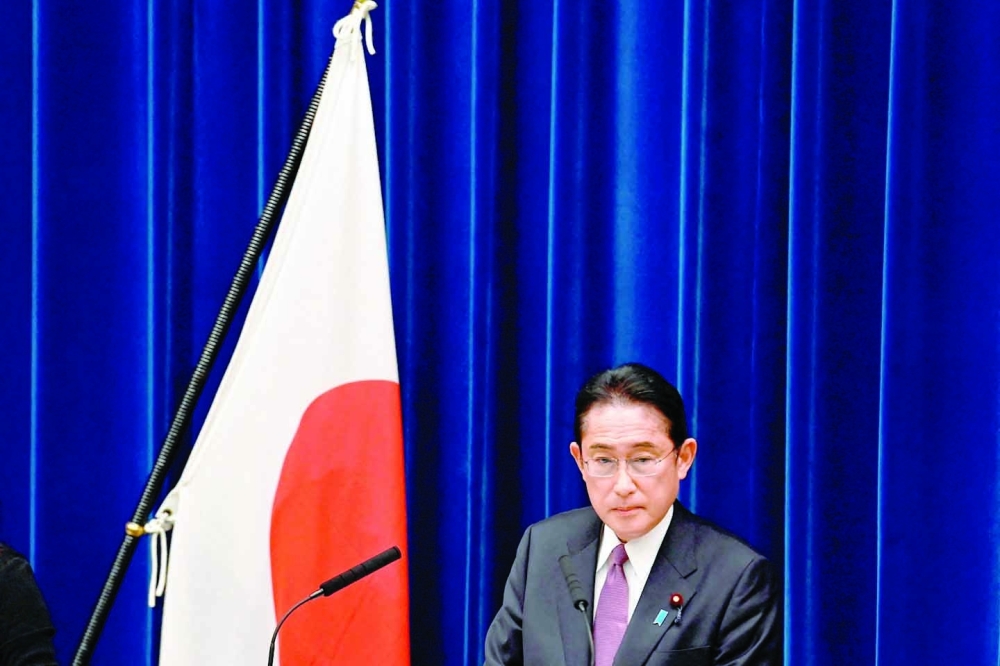

Fumio Kishida, Prime Minister of Japan, when compared with some of very aggressive predecessors, is generally considered to have a relatively passive approach in handling domestic political matters as well as external policies.
Particularly, in the wake of his depleting approval ratings after the “forced” resignations of key members of his cabinet due to their alleged links with the Unification Church, his detractors were expecting him to further crumble down in the face of his rather ill-planned expansion in the defence budget.
In this month, in addition to getting the cabinet approval of the much-touted new National Security Strategy (NSS), which has comprehensively defined all major threats to Japan’s security and devised an elaborated action plan to tackle them, Kishida also announced an unprecedented increase in defence budget, which generated a lot of debate within the ruling Liberal Democratic party (LDP) over the question of how to generate funds for such a massive increase in the defence budget.
China’s growing assertiveness in the Indo-Pacific, North Korea’s sabre rattling and Russia’s attack on Ukraine are some of the major factors that have been compelling the Japanese leadership for quite some time to give a new transform former Premier Shinzo Abe’s “pacifist activism” into aggressive activism. Increment is the defence budget is very much part of the emerging aggressive thinking in Japan to respond to the existential threats to the country’s security.
In order to divert the attention of the simmering public resentment against the links between the Unification Church and some top tier members of the LDP, Kishida announced a game plan for increased defence spending that included additional taxes, But soon he was forced to punt in the face of a stronger than expected opposition blitz from within his own party on the methodology how to funnel the additional money for such ambitious expansion in the defence budget. Interestingly, the ruling Liberal Democratic Party’s tax panel gave its affirmative nod to raise taxes in order to generate money to meet Kishida’s goal of jacking up defence spending from existing 1 per cent to 2 per cent of gross domestic product by 2027.
However, the tax panel also did not elaborate specific timelines for these new taxes, leaving questions about when, or even if, new taxes might be introduced. Kishida, who had been advocating for a step-wise and phase-wise increase, was compelled to back off from a specific timetable for tax hikes to pay for defence spending of ¥43 trillion over the next five years, starting in the 2023 fiscal year.
Kishida was subjected to severe criticism by the backbenchers of his own party, who were demanding him to consider issuing government bonds to pay for at least some of the increase instead of introducing new taxes. Kishida, a former banker, and his supporters within the Finance Ministry, were resisting the idea of issuing new bonds because of the country’s record debts.
According to the Finance Ministry, by the end of the current fiscal year, government debt will surpass ¥1 quadrillion, or 262.5 per cent of GDP, the highest among the Group of Seven leading industrialised countries. Not surprisingly, the pro-Abe faction within the LDP has been leading this revolt against Kishida’s tax increase plan despite agreeing to defence budget increment. Although, for the time being, Kishida has “managed” this crisis over the tax plan by accepting his opponents’ demand, but the situation for him is growing tense.
There is no imminent threat to his seat from the opposition because the next general elections will take place after three years, but Kishida is facing a tough challenge from within his cabinet and party leadership.
There are many aspirants within the LDP – in fact, inside Kishida’s cabinet – who are vying for the top slot. Digital Minister Kono Taro and Minister of Economic Security Takaichi Sanae, both contested against Kishida in the 2021 LDP presidential race and have never kept their desire secret that they would want to succeed Kishida someday. Similarly, LDP Party Secretary General Motegi Toshimitsu has also divulged his intentions that he would run for LDP president in the near future, too.
Some of Kishida’s detractors are even pinning their hopes on former Prime Minister Suga Yoshihide, who has improved his stature within the party after his quitting as party leader, that he stands a good chance to be reinstated as prime minister - although Suga has declined to re-enter in the race to replace Kishida. So, Kishida is going to have a tough time in the coming days. Things will be quite thorny for him.
Oman Observer is now on the WhatsApp channel. Click here



